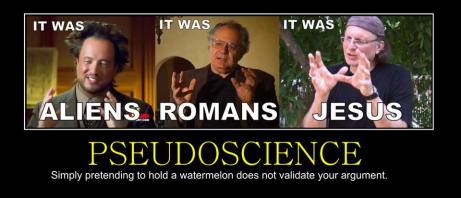
Simply put, pseudoarchaeology is fake archaeology. The suffix, pseudo-, which comes from the Greek word pseudein (and means “to cheat” or “to lie”) is added to the word archaeology.
In a much broader sense, pseudoarchaeology is that which purports to be archaeological claims, conclusions, ideas, or notions which have fake, fraudulent, or overly fantastic bases in reality rather than being solidly grounded in scientific method. Archaeology is the study of human culture through its material remains and, like any branch of science, it is done by careful and thorough observation, using consistent logic to evaluate data.

There are several reasons why people believe in or propagate pseudoarchaeological claims:
Nationalism – the claim about archaeology furthers a nationalist or regional bias. Many believers in this sort of pseudoarchaeology are accidently drawn in because of their own natural bias, patriotism, or regional loyalty. The originators of such pseudoarchaeology are, however, frequently aware of the false nature of the propaganda they’re pushing.
Religious – similar to nationalist-pseudoarchaeology, religious-pseudoarchaeology is often another form of propaganda, although there are probably many more originators of this form that truly believe what is they’re claiming. In this type of pseudoarchaeology, claims often begin with conclusions to which data are then “discovered” which are supportive. Non-supporting data are either casually dismissed or completely ignored.
Mystery-Monger for the Significance-Junkie – We’re all a bit addicted to significance. We’re naturally attracted to things that are the biggest, fastest, loudest, most-expensive, most-beautiful, most-dangerous, oldest, newest, etc. And modern television reality TV has cornered the market on this sensibility. For most of us, we indulge it for some cheap entertainment then move on. But there are those willing to make money at our willingness to consume this brand of pseudoarchaeology.
Shows like Ancient Aliens books about ancient cities abound, treating the average viewer with all manner of seemingly plausible explanations for phenomena that range from very real to completely made up. The mystery-mongers are the shows and authors, selling fake archaeological claims to a fascinated public better than a Seattle fishmonger.
Bad Archaeology – then there’s just plain old bad science. It happens. sometimes intentionally; sometimes completely unintentionally. There will always be those that cherry-pick their data, do p-hacking, or simply refuse to overcome their own biases.
A main focus here at The Archaeology Review has always been the exposure of pseudoarchaeological claims.
You may also want to see Seven Warning Signs of Pseudo Archaeology and The Hallmarks of Pseudoarchaeology.
Leave a Reply
You must be logged in to post a comment.